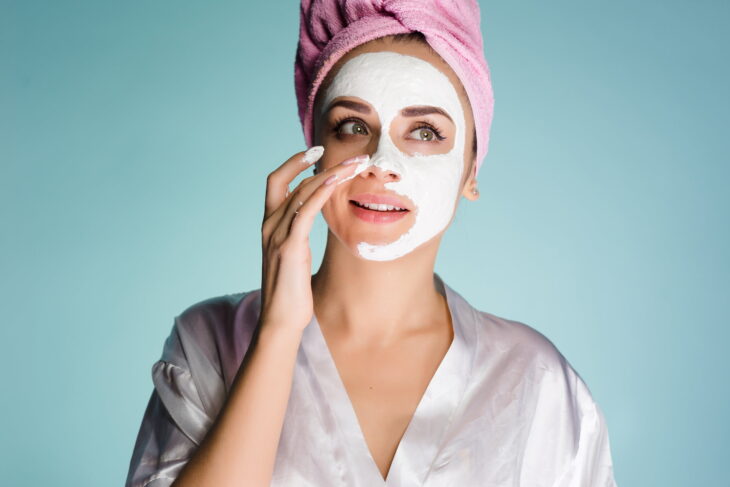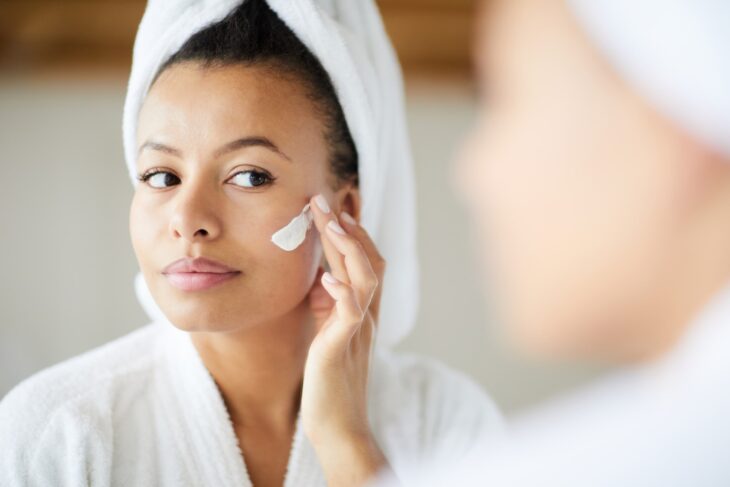Disclosure: Articles may contain affiliate links. As an Amazon Associate, we earn from qualifying purchases (at no additional cost to you). See our full disclosure here.
Last updated on March 14th, 2024 at 11:16 pm
Let’s be honest, not every TikTok skincare trend is worth your time. When social media encourages you to apply petroleum jelly to your face, shave with baby oil, and incorporate snail mucin into your beauty routine, it’s a good idea to rely on dermatologists to help you distinguish fact from fiction.
However, a hack directly from a doctor? We’re listening! Dr. Shereene Idriss, a New York dermatologist, offers skincare information in her TikTok series. One of her recent TikTok recommendations left us with some questions, so we did some research.
“Forget about face slugging—let’s talk about face basting,” Dr. Idriss suggests. “I use a zinc oxide-based cream. You guessed it: diaper rash cream all over my face, much to the dismay of my spouse, since zinc oxide is gold.” She does this after washing her face at night when she is in a really dry climate, and her skin is extremely dry.

Curious about this new trend? Keep reading to learn about its benefits, who it’s best for, and how to do it at home.
What is face basting?
Face basting is a technique I developed to heal a dry, irritated skin barrier using a zinc-oxide-based diaper rash ointment,” says Dr. Idriss. Diaper creams like Triple Paste, Desitin, or Weleda have zinc oxide and other ingredients that are anti-inflammatory and antimicrobial.
If you have dry skin, yet tend to turn greasy or acne-prone in your T-zone, cornstarch can help. Oat kernel extract is also anti-inflammatory and a natural humectant, which helps draw moisture to your skin. These are a few of the ingredients found in some diaper creams.
The Benefits
The primary goal of face basting is to decrease inflammation and restore the skin barrier. While many may find the idea of using diaper rash cream on your face strange at first glance, other specialists believe it makes sense. Here’s why:
Skin inflammation can be caused by dryness, a response to a skincare product, or an underlying skin problem, such as eczema or acne. You may also get inflammation as a result of overusing active substances like vitamin C, retinoids, and acids. In these cases, diaper rash cream, which contains zinc, can aid in wound-healing and tissue repair.
Diaper creams often contain skin protectants and emollients too. Emollient oils, such as dimethicone, mineral oil, and lanolin help to maintain the skin barrier. This physical barrier to moisture and irritants promotes healing and reduces inflammation.
Face Basting vs. Face Slugging
Face basting differs from skin slugging, which is putting a petrolatum-based ointment on your face overnight to hydrate it and decrease the signs of aging, including fine lines and wrinkles. Slugging with only petroleum jelly doesn’t help relieve inflammation.
Zinc oxide, on the other hand, improves hydration and contains anti-inflammatory ingredients that can help decrease redness, swelling, and irritation. A case study published last year discovered that using a facemask with a zinc-oxide-based lotion for 10 minutes helped restore moisture after a patient received laser therapy for acne scars.

How do you Face Baste?
Face basting is a rather simple technique. After completing your evening skincare routine (excluding any oils), use clean, dry hands to apply a thick coating of zinc-based cream to your skin, icing your face like a cupcake. You’ll know you’ve applied enough when your face turns ghostly white (or like a Magnolia buttercream cupcake, as Dr. Idriss describes it).
The cream melts into your skin overnight, so there’s no need to cleanse it in the morning; simply rinse with water, and enjoy your newly hydrated, supple, and dewy-looking skin.
If you’re on a retinol regimen, we recommend making this part of your routine on nights in between treatments to reduce the chance of irritation and speed up healing if you’re experiencing retinoid-related discomfort.
What Skin Types Are Compatible with Face Basting?
Before experimenting with any trend, consider your skin type. Face basting is great for people with dry, sensitive, or inflammatory skin who need intense hydration, particularly in the winter when skin is more prone to dryness. The paste’s texture and thick consistency will help benefit the skin barrier by lowering Transepidermal water loss (TEWL).
Zinc forms a protective barrier on the skin, sealing in moisture and hydration while keeping irritants out, which is why it’s a prominent element in diaper rash treatments.
Face basting can help make your retinoid treatment, which can be quite harsh, a bit more comfortable for your skin. Retinoids and retinol can cause skin irritation, including redness, dryness, itching, and flaking. Face basting may help the skin recover.
Just keep in mind that layering your retinoids and retinol underneath a thick, zinc-based ointment isn’t recommended. A zinc-based ointment can occlude the skin, amplifying the effects of retinoids and retinol. That’s why it’s best to practice face basting only on days you’re not using retinols.
Finally, because zinc has antibacterial qualities, it may help reduce acne-causing bacteria and improve the look of inflammatory acne (pimples and pustules). Zinc’s anti-inflammatory characteristics make it beneficial for early-stage breakouts that are red and irritated; it can also help lessen the redness and swelling of these lesions and speed healing.
However, not all zinc is created equal, so consider this if you’re primarily face basting to treat acne. While zinc oxide has some antibacterial effects, zinc gluconate is more often used for its acne-fighting abilities. And, while zinc gluconate has anti-inflammatory qualities, they’re not as strong as zinc oxide.
While browsing the baby aisle at the drugstore, be sure you read the ingredients before buying a diaper rash cream. Lanolin, mineral oil, wax, or petroleum jelly are some of the ingredients that may be included in diaper cream. These substances may cause irritation, blocked pores, or acne. You can get better results by using a thick face moisturizer and skin barrier-boosting products.
Bottom line: if your skin is dry, inflammatory, and irritated, use zinc oxide; if it’s dry and prone to breakouts, use zinc gluconate. If you have oily skin, you may want to avoid face basting since it can be excessively heavy and may increase oiliness, perhaps causing additional acne.
There you have it–now you know about face basting, if you didn’t already. Is it something you’re ready to try? Leave us a comment.
Also read:
Peptides vs Retinol: Which is Better for Your Skin
DIY Coconut Lime Mint Sugar Scrub with Free Printable Labels
Glow Up Challenge + 5 Pages of Printables, Including Daily Trackers to Keep You Motivated
You can also find MomsWhoSave on Pinterest, Facebook, Instagram, and Twitter. Join us for updates.
Leave a Reply